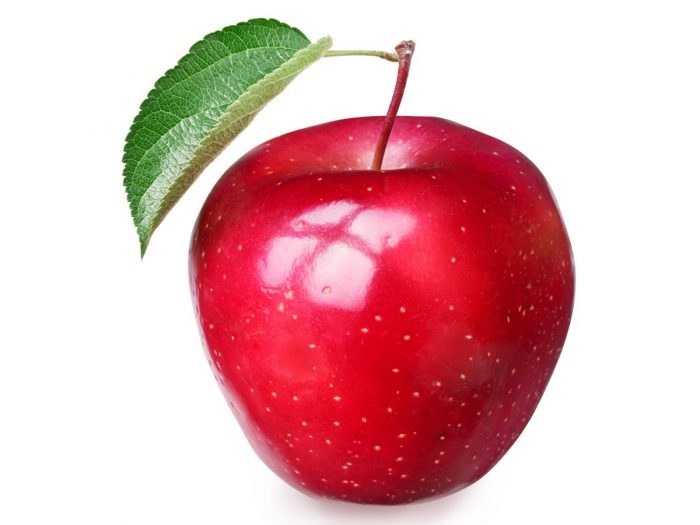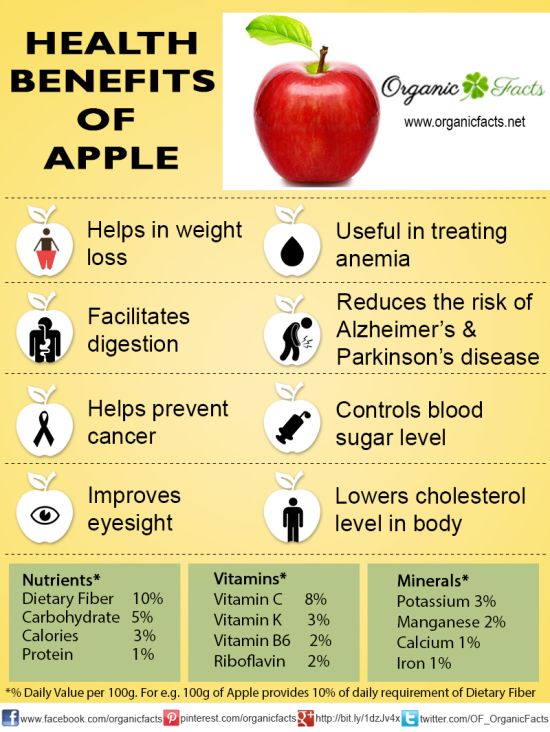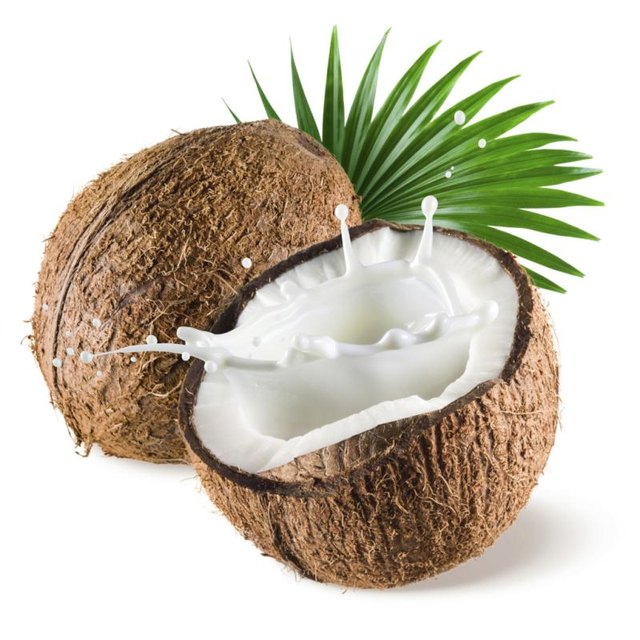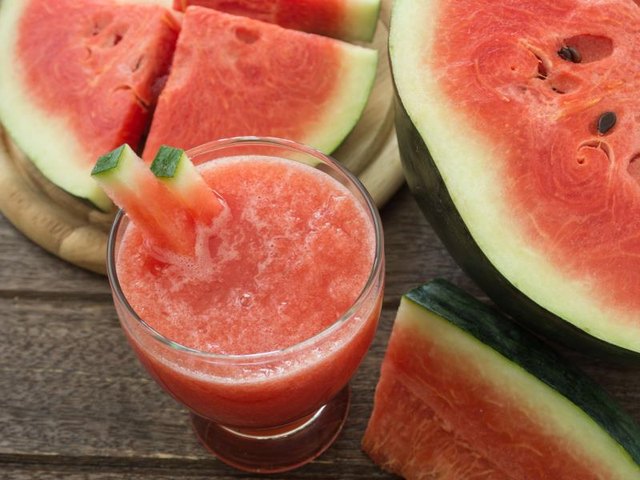Health Benefits of Apples
The health benefits of apples include improved digestion, prevention of stomach disorders, gallstones, constipation, liver disorders, anemia, diabetes, heart disease, rheumatism, eye disorders, a variety of cancers, and gout. It also helps in improving weakness and provides relief from dysentery. Apples also help in treating dysentery. Furthermore, apples can prevent the onset of Alzheimer’s and Parkinson’s disease. Finally, apples aid in dental care and skin care.
Apples are some of the most popular and delicious fruits on the planet, and there is nothing like biting into a bright, red, juicy apple to quench your thirst and satisfy your sweet tooth, all while boosting your health in a major way. The apple is a pomaceous fruit whose tree belongs to the Rosaceae family, and it has the scientific name of Malus domestica. Its ancestor is the Malus sieversii, which still grows wild in numerous parts of Central Asia. They have been cultivated for thousands of years throughout Asia and Europe, and they make appearances in the cultural history of many ancient civilizations, including the Greeks, Romans, and Nordic tribes. It only made its way to the American with European colonizers, but quickly “took root” and is now grown extensively in appropriate regions of North America.
There are more than 7,500 varieties of this delicious fruit, and it comes in a variety of colors, including red, yellow, and green. The skin of apples is thin, but sturdy, and the inner flesh is thick and juicy, and it softens as it ripens. The inner core holds the seeds, which are hard and difficult to digest. The nutrients are in the flesh and the skin, which is a rich source of anthocyanins and various tannins that give its color. It’s true what they say, “An apple a day keeps the doctor away!”
Apples can be eaten raw right off the tree or in a variety of dishes such as fruit salads and custards. Apple juice is also a common drink throughout the world, and it is also included in many desserts. Apples can be baked, minced, mashed, frozen, or even dried into chips as a healthy, sweet snack. In 2010, the completegenome of the apple was decoded, which has led to an increase in research and understanding of why apples are so beneficial for our health, and what specific components are responsible for the boost! Let’s take a look at some of those essential components of one of the world’s favorite and healthiest fruits!
Nutritional Value of Apples
The long list of health benefits attributed to apples are due to the wealth of vitamins, minerals, nutrients, and organic compounds that are found in them. These important nutritional elements include vitamin C, vitamin K, vitamin B6, and riboflavin, as well as minerals like potassium, copper, manganese, and magnesium. Apples are also very good sources of dietary fiber, and a single serving provides 12% of the daily fiber requirement. The real value of apples lies in its organic compounds. It is packed with phytonutrients and flavonoids like quercetin, epicatechin, phloridzin, and various other polyphenolic compounds.
Health Benefits of Apples
The health benefits of apples include the following:
Digestion: Apples, being rich in fiber, help in the digestive process. Regular consumption of apples ensures smooth bowel movements and helps in preventing constipation and various stomach disorders. Fiber is an important part of any diet. It adds bulk to the stool and helps food pass through the digestive tract smoothly. Furthermore, it stimulates peristaltic motion so the muscles contract appropriately and move food along. Finally, it stimulates the release of gastric and digestive juices to ensure efficient uptake of nutrients, while simultaneously scraping excess cholesterol out of your veins and arteries to ensure proper heart health and reduce chances of atherosclerosis.
 Cancer Prevention: The role of apples in cancer prevention has been a subject of study for some time, and while they have shown moderate improvement in various types of cancer, particularly breast and colon cancer, the most significant discoveries have been regarding lung cancer. Most fruits and vegetables have some sort of anti-cancer effects, but apples stand head and shoulders among the rest in terms of commonly consumed fruits. They show a distinct and undeniable capacity to reduce lung cancer and slow its spread if it does develop. Hypotheses usually speak to the high phytonutrient content, including kaempferol and quercetin, but the exact mechanism for apples’ impact on cancer is still largely unclear.
Cancer Prevention: The role of apples in cancer prevention has been a subject of study for some time, and while they have shown moderate improvement in various types of cancer, particularly breast and colon cancer, the most significant discoveries have been regarding lung cancer. Most fruits and vegetables have some sort of anti-cancer effects, but apples stand head and shoulders among the rest in terms of commonly consumed fruits. They show a distinct and undeniable capacity to reduce lung cancer and slow its spread if it does develop. Hypotheses usually speak to the high phytonutrient content, including kaempferol and quercetin, but the exact mechanism for apples’ impact on cancer is still largely unclear.
Digestive Health: One of the most essential and overlooked parts of human health is the beneficial bacteria living throughout our body. Apples specifically help improve the functioning of the bacteria living inside of our large intestine, and early studies show that apples change the metabolism within the digestive tract, and change the balance of bacteria, which leads to improved health by maximizing nutrient uptake and eliminating harmful bacteria and toxins.
Anemia: Apples are useful in treating anemia since apples are a rich source of iron. Anemia is a deficiency of hemoglobin in the blood, which can be fixed by increasing your intake of iron, which is an integral part in the metabolism of red blood cells. By increasing the amount of red blood cells in the body, you not only prevent anemia, but also ensure proper oxygenation of essential organ systems to keep them functioning properly.
Weakness: Apples are known to remove weakness and add vigor and vitality to weak people. It is, therefore, often given to patients to help them recover quickly from their illnesses. If you want to gain weight, apples should be a part of your daily diet. It also helps in detoxifying the body and improving the overall health of the body. Although it doesn’t contain a significant amount of protein, the combination of the antioxidant compounds and the protein found in apples can have a major role in preventing weakness and improving muscle tone.
Managing Diabetes: Blood sugar control is essential for people who suffer from diabetes, and the polyphenols in apples have been directly linked to reducing the uptake of carbohydrates by the body. This, in turn, reduces the fluctuation of blood sugar levels that occur in the bloodstream, an important factor for helping to keep diabetes in check. It doesn’t stop there, however. The polyphenols also lower glucose absorption in our digestive tract, and they stimulate the release of insulin from our pancreas, which is necessary to keep blood sugar levels in check. Finally, thepolyphenols stimulate the insulin receptors on cells throughout our body, which speeds up the removal of sugar from our bloodstream and gets it to our cells, which need it for metabolism and proper organ function. Apples are one of the best all around foods for improving the health of people suffering from diabetes.
Dental Care: Eating apples helps in cleaning both the teeth and gums. Furthermore, it reduces the incidence of cavities in the teeth. When you eat apples, the fiber in it cleanses the teeth, while the antibacterial properties of the fruit keep bacteria and viruses from infecting the body. Eating apples also stimulates the secretion of saliva, which is an alkalinic compound, meaning that it further reduces the ability of bacteria to multiply and grow in your mouth.
Alzheimer’s and Parkinson’s Disease: As if the other impressive benefits of apples weren’t enough, they also show a positive impact on neurological issues, particularly two of the most tragic conditions, Alzheimer’s and Parkinson’s disease. The antioxidant effects of all the phytonutrient compounds in apples certainly help reduce Alzheimer’s disease, since the degeneration of the brain that leads to Alzheimer’s has been linked to free radical activity. Apples also increase the amount of acetylcholine in the brain, which is linked to concentration, problem-solving, and memory. In terms of Parkinson’s, apples stop the gradual breakdown of dopamine-producing nerve cells, which can be an underlying cause of Parkinson’s.
Respiratory Issues: Our respiratory system is highly susceptible to inflammation, and a number of respiratory conditions are directly related to an inflammation of membranes and cells in that system. Asthmais perhaps the most serious, as it can be fatal in severe cases. Apples have shown tremendous anti-inflammatory behavior, and in terms of asthma, apples have stood out among other natural treatments, even superseding the benefits of consuming fruits and vegetables in combination. Apples remain a mystery to the world in terms of their complex mechanisms of healing these conditions, most likely because there are so many possible nutrients found in apples that could potentially be responsible for the health perks!
Heart Disease: Apples lower the level of cholesterol in the body, making it a strong defensive mechanism against cardiovascular disease. The adage of “an apple a day keeping the doctor away” is more accurate than you’d think, since the daily dose of an apple deemed healthy for the heart is approximately one per day. The antioxidant activity in apples reduces the oxidation of fats, called lipid peroxidation and includes neutralizing triglycerides and and various fats found between blood vessels that can exert dangerous pressure. Also, apples contain a very powerful flavonoid called quercetin, found in the skin of apples, can reduce inflammation in our blood vessels by reducing the amount of C-reactive protein (CRP). This protein has been linked to inflammation of the cardiovascular system, so a reduction of it through quercetin makes apples very strong heart boosters!
 Rheumatism: Patients who are suffering from rheumatism find apples very useful as they aid in the healing process. Along with the healing process, and perhaps more importantly, are the huge amount of flavonoid compounds found in apples. This has been the most exciting recent development in apple research, and flavonoid compounds like kaempferol, quercetin, and myricetin have been linked to reducing rheumatoid conditions, and inflammatory conditions like arthritis and gout.
Rheumatism: Patients who are suffering from rheumatism find apples very useful as they aid in the healing process. Along with the healing process, and perhaps more importantly, are the huge amount of flavonoid compounds found in apples. This has been the most exciting recent development in apple research, and flavonoid compounds like kaempferol, quercetin, and myricetin have been linked to reducing rheumatoid conditions, and inflammatory conditions like arthritis and gout.
Eye Disorders: Apples are believed to make the eyes stronger andimprove eyesight. They also help in treating night blindness. Much of this is due to the fact that apples are rich in flavonoid compounds and antioxidant phytonutrients, which can reduce the impact of free radicals on the eyes, while preventing conditions like macular degeneration, cataracts, and glaucoma.
Weight Loss: Aside from the normal ability of fibrous fruits to make us feel full and increase satiety, thereby reducing appetite and overeating, apples have another unexplained ability to help in our weight loss aims. Studies have shown that apples actually speed up our metabolism so that additional calories consumed after eating an apple don’t register as much in our body. Meaning, they are burned off quicker, or not absorbed by the body at all. This can be serious news for the millions of people who struggle with obesity around the world.
Skin Care: Pastes made of apple and honey, and apple and milk increase the shine and glow of the skin when topically applied. This is again due to the powerful antioxidants contained in the skin and flesh of apples. These compounds counteract the damaging effects of free radicals that are directly linked to premature aging, as well as wrinkles, age spots, and other age-related conditions. Its boosting effect on circulation also helps keep the skin looking young by keeping blood flow constant to stimulate the replacement of old cells and the repair of damaged ones!










